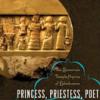-
Posts
645 -
Joined
-
Last visited
-
Days Won
13
Reputation Activity
-
 Medievalmaniac got a reaction from zphil22 in SOP mistakes: what to avoid
Medievalmaniac got a reaction from zphil22 in SOP mistakes: what to avoid
I'm starting this thread as a chance to help others learn from my mistake(s), and I hope others will be generous with their lessons learned as well.
I JUST thought to look at my transcripts, and realized that two of the classes in which I did the most work in my area of study do not reflect that on the transcript!! They just say "ENGL _____, Literature and Culture" and ENGL ____, British Literature. I didn't even think to talk about the work I did in these classes in my SOP, I focused on my thesis, my conference activity, and what I want to do for my dissertation -so, while I'm sure my professor's letter of recommendation discusses it to some degree, essentially I applied for medieval literature with only one course actually labeled as such on my transcript. My SOP focused very heavily on what I wanted to do in a doctoral program, while (now I see very clearly) only nominally, superficially, expressing why I was qualified to do it. WOW. No WONDER some of the programs I applied to didn't even consider me as a serious applicant!!
So - from my experience, check what your transcript says about the classes you took/the titles they are filed under, and make sure you discuss in detail for about a paragraph the pertinent coursework you did - texts read, etc. etc.
And boy, do I feel dumb!! But at least now I can see where to go in my next round of apps!!
Anyone else got some good, specific pointers?
-
 Medievalmaniac got a reaction from sacrover in SOP mistakes: what to avoid
Medievalmaniac got a reaction from sacrover in SOP mistakes: what to avoid
I'm starting this thread as a chance to help others learn from my mistake(s), and I hope others will be generous with their lessons learned as well.
I JUST thought to look at my transcripts, and realized that two of the classes in which I did the most work in my area of study do not reflect that on the transcript!! They just say "ENGL _____, Literature and Culture" and ENGL ____, British Literature. I didn't even think to talk about the work I did in these classes in my SOP, I focused on my thesis, my conference activity, and what I want to do for my dissertation -so, while I'm sure my professor's letter of recommendation discusses it to some degree, essentially I applied for medieval literature with only one course actually labeled as such on my transcript. My SOP focused very heavily on what I wanted to do in a doctoral program, while (now I see very clearly) only nominally, superficially, expressing why I was qualified to do it. WOW. No WONDER some of the programs I applied to didn't even consider me as a serious applicant!!
So - from my experience, check what your transcript says about the classes you took/the titles they are filed under, and make sure you discuss in detail for about a paragraph the pertinent coursework you did - texts read, etc. etc.
And boy, do I feel dumb!! But at least now I can see where to go in my next round of apps!!
Anyone else got some good, specific pointers?
-
 Medievalmaniac got a reaction from Appiah4 in SOP mistakes: what to avoid
Medievalmaniac got a reaction from Appiah4 in SOP mistakes: what to avoid
I think that's great, and gives you a perfect topic for your SOP. "As an undergraduate, my focus was on African American and Women's Studies, where I specifically looked at <insert specific topics you wrote about in these courses>. As a graduate student, I have found my interests expanding to include more theoretical and rhetorical approaches to literature, including specifically work I have done in Bakhtinian views of <insert specific topics here>. As a doctoral student, I hope to combine these interests into a research program that.......
You get the picture. Just tell them where you were, where you are, and where you see yourself going.
Hope that helps!!
-
 Medievalmaniac got a reaction from balea in Rejected... how do you respond?
Medievalmaniac got a reaction from balea in Rejected... how do you respond?
I advocate for asking what you could do to be a better candidate, in the event you got no acceptances - otherwise, how will you know? The worst they will do is just not reply or tell you due to time constraints they can't respond.
If you plan on going into academia whether or not you get into the other programs, it would be a good idea to send a note. Academia is a small world, and it doesn't hurt to be civil and maintain civil contact with others who could potentially be your colleagues someday. Just because you aren't going into their department doesn't mean you won't someday see them on a conference panel, have them editing your paper for publication, acting as outside readers for your dissertation...it pays to be circumspect about that. You never know when you'll need to be on good terms with academics you aren't studying with...
-
 Medievalmaniac got a reaction from Saurabh Goel in SOP mistakes: what to avoid
Medievalmaniac got a reaction from Saurabh Goel in SOP mistakes: what to avoid
I'm starting this thread as a chance to help others learn from my mistake(s), and I hope others will be generous with their lessons learned as well.
I JUST thought to look at my transcripts, and realized that two of the classes in which I did the most work in my area of study do not reflect that on the transcript!! They just say "ENGL _____, Literature and Culture" and ENGL ____, British Literature. I didn't even think to talk about the work I did in these classes in my SOP, I focused on my thesis, my conference activity, and what I want to do for my dissertation -so, while I'm sure my professor's letter of recommendation discusses it to some degree, essentially I applied for medieval literature with only one course actually labeled as such on my transcript. My SOP focused very heavily on what I wanted to do in a doctoral program, while (now I see very clearly) only nominally, superficially, expressing why I was qualified to do it. WOW. No WONDER some of the programs I applied to didn't even consider me as a serious applicant!!
So - from my experience, check what your transcript says about the classes you took/the titles they are filed under, and make sure you discuss in detail for about a paragraph the pertinent coursework you did - texts read, etc. etc.
And boy, do I feel dumb!! But at least now I can see where to go in my next round of apps!!
Anyone else got some good, specific pointers?
-
 Medievalmaniac got a reaction from Jenn M. in SOP mistakes: what to avoid
Medievalmaniac got a reaction from Jenn M. in SOP mistakes: what to avoid
I'm starting this thread as a chance to help others learn from my mistake(s), and I hope others will be generous with their lessons learned as well.
I JUST thought to look at my transcripts, and realized that two of the classes in which I did the most work in my area of study do not reflect that on the transcript!! They just say "ENGL _____, Literature and Culture" and ENGL ____, British Literature. I didn't even think to talk about the work I did in these classes in my SOP, I focused on my thesis, my conference activity, and what I want to do for my dissertation -so, while I'm sure my professor's letter of recommendation discusses it to some degree, essentially I applied for medieval literature with only one course actually labeled as such on my transcript. My SOP focused very heavily on what I wanted to do in a doctoral program, while (now I see very clearly) only nominally, superficially, expressing why I was qualified to do it. WOW. No WONDER some of the programs I applied to didn't even consider me as a serious applicant!!
So - from my experience, check what your transcript says about the classes you took/the titles they are filed under, and make sure you discuss in detail for about a paragraph the pertinent coursework you did - texts read, etc. etc.
And boy, do I feel dumb!! But at least now I can see where to go in my next round of apps!!
Anyone else got some good, specific pointers?
-
 Medievalmaniac got a reaction from sooheen in SOP mistakes: what to avoid
Medievalmaniac got a reaction from sooheen in SOP mistakes: what to avoid
I'm starting this thread as a chance to help others learn from my mistake(s), and I hope others will be generous with their lessons learned as well.
I JUST thought to look at my transcripts, and realized that two of the classes in which I did the most work in my area of study do not reflect that on the transcript!! They just say "ENGL _____, Literature and Culture" and ENGL ____, British Literature. I didn't even think to talk about the work I did in these classes in my SOP, I focused on my thesis, my conference activity, and what I want to do for my dissertation -so, while I'm sure my professor's letter of recommendation discusses it to some degree, essentially I applied for medieval literature with only one course actually labeled as such on my transcript. My SOP focused very heavily on what I wanted to do in a doctoral program, while (now I see very clearly) only nominally, superficially, expressing why I was qualified to do it. WOW. No WONDER some of the programs I applied to didn't even consider me as a serious applicant!!
So - from my experience, check what your transcript says about the classes you took/the titles they are filed under, and make sure you discuss in detail for about a paragraph the pertinent coursework you did - texts read, etc. etc.
And boy, do I feel dumb!! But at least now I can see where to go in my next round of apps!!
Anyone else got some good, specific pointers?
-
 Medievalmaniac got a reaction from MrBixler in SOP mistakes: what to avoid
Medievalmaniac got a reaction from MrBixler in SOP mistakes: what to avoid
I'm starting this thread as a chance to help others learn from my mistake(s), and I hope others will be generous with their lessons learned as well.
I JUST thought to look at my transcripts, and realized that two of the classes in which I did the most work in my area of study do not reflect that on the transcript!! They just say "ENGL _____, Literature and Culture" and ENGL ____, British Literature. I didn't even think to talk about the work I did in these classes in my SOP, I focused on my thesis, my conference activity, and what I want to do for my dissertation -so, while I'm sure my professor's letter of recommendation discusses it to some degree, essentially I applied for medieval literature with only one course actually labeled as such on my transcript. My SOP focused very heavily on what I wanted to do in a doctoral program, while (now I see very clearly) only nominally, superficially, expressing why I was qualified to do it. WOW. No WONDER some of the programs I applied to didn't even consider me as a serious applicant!!
So - from my experience, check what your transcript says about the classes you took/the titles they are filed under, and make sure you discuss in detail for about a paragraph the pertinent coursework you did - texts read, etc. etc.
And boy, do I feel dumb!! But at least now I can see where to go in my next round of apps!!
Anyone else got some good, specific pointers?
-
 Medievalmaniac got a reaction from justanotherlostgrrl in Older grad students
Medievalmaniac got a reaction from justanotherlostgrrl in Older grad students
I went back as a mid-thirties mother of one to finish my graduate degree, and there are a few things I noticed specifically (that may or may not apply to you, dependent upon your seriousness in the field/ about school overall) - I am a very serious and driven student, and was even more so with a one-hour commute and a young child, plus a full-time job, while I was doing my degree. needless to say, my only real contact with these people was during class and during the breaks in classes/ times between them, but you do learn a lot about one another through discussions and such - I never felt I was missing out socially, mainly because I was older and didn't WANT to go to frat parties and sorority stuff. We occasionally went to the local pub after classes, which was a great time to just relax before driving home, but not often, because I had to get up and teach the next day.
I do remember being just floored at some of the shenanigans going on during class (especially in one upper-division undergrad/grad class blend, which ostensibly only had junior and senior English majors and graduate students enrolled in it). I could not believe some of the behaviors - personal conversations, texting (despite its being expressly stated in the syllabus this was not allowed) - and the number of classes some students skipped. One girl had a pizza delivered on an evening during which the professor had us watching a film in class - harmless stuff, really, but there was definitely a lot of immaturity going on, more often than probably should have been the case. I remember feeling really almost despairing over all the wasted time, both in the class and outside of class, with some of these students. I know undergrads are a different sort, and certainly, I myself had some less-than-stellar moments in some of my classes, but it seemed really in-your face and disrespectful (and the professor did eventually have to say something about the texting, which prompted the person in violation of the syllabus doing it to accuse her of picking on him, go figure). I remember that some of the undergrads were amazing, so focused and prepared, and I was really impressed with them. The serious younger students congregated together, they formed something of a core, and I never had trouble talking with or forging relationships with them; in fact, they sort of adopted me as their role model/mascot, in a way, which was fun and funny. Mainly, the undergrads were in-between being younger and starting to professionalize, and class discussions were really good some nights, not so good other nights - typical. I did enjoy class.
I remember that among my fellow graduate students there was a lot of complaining about the reading for some classes in comparison to others, which I was annoyed by - you're in graduate school for English, what the hell did you expect it was going to be? There were several women in their late thirties in the program, and I am certain there were older students as well, just not in the classes I was taking, they had a more modern bent. I do remember that I was disappointed my fellow graduate students weren't more advanced and weren't trying to be more advanced - I wanted to have really in-depth, serious, academic discussions about Middle English and Old English meter and so forth, and none of my cohort was vaguely interested in trying for anything like mastery or proficiency, they just wanted to do the work, get the grade, and get out. One woman in particular got her nose all bent out of joint because she was working in Early Modern and claimed Chaucer was a contemporary of Malory (neither of whom is an early modern author and who are in fact NOT contemporaries at ALL). In a room full of undergraduates who thought the grad students knew everything and were writing down notes, I felt compelled to correct that comment; the professor corroborated, and that woman never spoke to me again (I guess she showed me...) because "I made her look bad in front of the professor". But, the mistake she made would not have been made if she had bothered to do ANY research on EITHER of the figures in question. I was disappointed in the lack of initiative so many upper-division students showed...didn't they WANT to know more? (answer, because I asked one of them - not really, they were just trying to get their degree). I was just different, I was surely in it for the degree, but mainly for the information and the research and writing and debating and discussing - in short, I was academically inclined, and they were job-inclined. Once I understood that, it got better because I realized I was only there for me and therefore had to work at my pace, my pace was faster and on a different track than theirs, and that was totally OK. (More than OK, really; my professors loved me. I had one petition me, pregnancy and all, to please, PLEASE just take the class, they'd make any necessary arrangements when I gave birth, but please just be in the class to bring up the level of discourse more - which was maybe the best academic compliment I ever received as a student. )
Long and short of it is - why are you going to graduate school? It will be whatever you think it is. I had an amazing time, some of the undergrads I was in courses with are my Facebook buddies, and the rest...well, I think they probably are not on this forum trying to get into graduate school for further study of English anyhow, so, meh. .
-
 Medievalmaniac got a reaction from brick@37 in SOP mistakes: what to avoid
Medievalmaniac got a reaction from brick@37 in SOP mistakes: what to avoid
I'm starting this thread as a chance to help others learn from my mistake(s), and I hope others will be generous with their lessons learned as well.
I JUST thought to look at my transcripts, and realized that two of the classes in which I did the most work in my area of study do not reflect that on the transcript!! They just say "ENGL _____, Literature and Culture" and ENGL ____, British Literature. I didn't even think to talk about the work I did in these classes in my SOP, I focused on my thesis, my conference activity, and what I want to do for my dissertation -so, while I'm sure my professor's letter of recommendation discusses it to some degree, essentially I applied for medieval literature with only one course actually labeled as such on my transcript. My SOP focused very heavily on what I wanted to do in a doctoral program, while (now I see very clearly) only nominally, superficially, expressing why I was qualified to do it. WOW. No WONDER some of the programs I applied to didn't even consider me as a serious applicant!!
So - from my experience, check what your transcript says about the classes you took/the titles they are filed under, and make sure you discuss in detail for about a paragraph the pertinent coursework you did - texts read, etc. etc.
And boy, do I feel dumb!! But at least now I can see where to go in my next round of apps!!
Anyone else got some good, specific pointers?
-
 Medievalmaniac got a reaction from Yugioh in Adjunct Faculty as Advisor
Medievalmaniac got a reaction from Yugioh in Adjunct Faculty as Advisor
NO!!!!!!!!!
Adjuncts are usually part-time, supplementary professors to the program, and generally teach at several universities in proximity to one another in order to make ends meet.
Only graduate faculty are allowed to advise graduate students. To be graduate faculty, you must be a full-time professor with an appropriate PhD and in good standing. Professors who are in phase-out retirement standing cannot serve as advisors, nor can "junior professors" (MA, ABD holders), and certainly not adjunct faculty members, who may or may not be rehired from one semester to the next dependent upon financial and course-related exigencies.
The website for a university, or the graduate catalog of the university or department, should have a list of faculty members you can approach as graduate advisors.
You CAN have an adjunct professor on your thesis or dissertation committee; in fact, for the dissertation, you must have at least one outside scholar as a member of your committee. But only if the professor has a PhD. MAs are usually not permitted to serve as graduate faculty or on graduate/thesis committees except under exceptional circumstances and with department approval ahead of time (that would be the blind leading the blind, yes? Or like being reviewed by a coworker instead of your supervisor). But they absolutely can't be thesis or dissertation advisors.
FYI, because it doesn't hurt to know, the order is:
Assistant Professor (junior faculty/ pre-tenure - can advise undergrads and sit on committees for graduate faculty; with appropriate degree, can serve as a graduate advisor (PhD only))
Associate Professor (usually awarded with tenure, must have a book)
Professor (highest full-time position in a department; often an endowed chair, but not always)
Emeritus (retired, but can still teach an occasional course and/or sit on a committee)
Hope that helps - good luck!
-
 Medievalmaniac got a reaction from neverdecaf in SOP mistakes: what to avoid
Medievalmaniac got a reaction from neverdecaf in SOP mistakes: what to avoid
I'm starting this thread as a chance to help others learn from my mistake(s), and I hope others will be generous with their lessons learned as well.
I JUST thought to look at my transcripts, and realized that two of the classes in which I did the most work in my area of study do not reflect that on the transcript!! They just say "ENGL _____, Literature and Culture" and ENGL ____, British Literature. I didn't even think to talk about the work I did in these classes in my SOP, I focused on my thesis, my conference activity, and what I want to do for my dissertation -so, while I'm sure my professor's letter of recommendation discusses it to some degree, essentially I applied for medieval literature with only one course actually labeled as such on my transcript. My SOP focused very heavily on what I wanted to do in a doctoral program, while (now I see very clearly) only nominally, superficially, expressing why I was qualified to do it. WOW. No WONDER some of the programs I applied to didn't even consider me as a serious applicant!!
So - from my experience, check what your transcript says about the classes you took/the titles they are filed under, and make sure you discuss in detail for about a paragraph the pertinent coursework you did - texts read, etc. etc.
And boy, do I feel dumb!! But at least now I can see where to go in my next round of apps!!
Anyone else got some good, specific pointers?
-
 Medievalmaniac got a reaction from Biohacker in SOP mistakes: what to avoid
Medievalmaniac got a reaction from Biohacker in SOP mistakes: what to avoid
I'm starting this thread as a chance to help others learn from my mistake(s), and I hope others will be generous with their lessons learned as well.
I JUST thought to look at my transcripts, and realized that two of the classes in which I did the most work in my area of study do not reflect that on the transcript!! They just say "ENGL _____, Literature and Culture" and ENGL ____, British Literature. I didn't even think to talk about the work I did in these classes in my SOP, I focused on my thesis, my conference activity, and what I want to do for my dissertation -so, while I'm sure my professor's letter of recommendation discusses it to some degree, essentially I applied for medieval literature with only one course actually labeled as such on my transcript. My SOP focused very heavily on what I wanted to do in a doctoral program, while (now I see very clearly) only nominally, superficially, expressing why I was qualified to do it. WOW. No WONDER some of the programs I applied to didn't even consider me as a serious applicant!!
So - from my experience, check what your transcript says about the classes you took/the titles they are filed under, and make sure you discuss in detail for about a paragraph the pertinent coursework you did - texts read, etc. etc.
And boy, do I feel dumb!! But at least now I can see where to go in my next round of apps!!
Anyone else got some good, specific pointers?
-
 Medievalmaniac got a reaction from mockingjay634 in Adjunct Faculty as Advisor
Medievalmaniac got a reaction from mockingjay634 in Adjunct Faculty as Advisor
NO!!!!!!!!!
Adjuncts are usually part-time, supplementary professors to the program, and generally teach at several universities in proximity to one another in order to make ends meet.
Only graduate faculty are allowed to advise graduate students. To be graduate faculty, you must be a full-time professor with an appropriate PhD and in good standing. Professors who are in phase-out retirement standing cannot serve as advisors, nor can "junior professors" (MA, ABD holders), and certainly not adjunct faculty members, who may or may not be rehired from one semester to the next dependent upon financial and course-related exigencies.
The website for a university, or the graduate catalog of the university or department, should have a list of faculty members you can approach as graduate advisors.
You CAN have an adjunct professor on your thesis or dissertation committee; in fact, for the dissertation, you must have at least one outside scholar as a member of your committee. But only if the professor has a PhD. MAs are usually not permitted to serve as graduate faculty or on graduate/thesis committees except under exceptional circumstances and with department approval ahead of time (that would be the blind leading the blind, yes? Or like being reviewed by a coworker instead of your supervisor). But they absolutely can't be thesis or dissertation advisors.
FYI, because it doesn't hurt to know, the order is:
Assistant Professor (junior faculty/ pre-tenure - can advise undergrads and sit on committees for graduate faculty; with appropriate degree, can serve as a graduate advisor (PhD only))
Associate Professor (usually awarded with tenure, must have a book)
Professor (highest full-time position in a department; often an endowed chair, but not always)
Emeritus (retired, but can still teach an occasional course and/or sit on a committee)
Hope that helps - good luck!
-
 Medievalmaniac got a reaction from 5224 in Adjunct Faculty as Advisor
Medievalmaniac got a reaction from 5224 in Adjunct Faculty as Advisor
NO!!!!!!!!!
Adjuncts are usually part-time, supplementary professors to the program, and generally teach at several universities in proximity to one another in order to make ends meet.
Only graduate faculty are allowed to advise graduate students. To be graduate faculty, you must be a full-time professor with an appropriate PhD and in good standing. Professors who are in phase-out retirement standing cannot serve as advisors, nor can "junior professors" (MA, ABD holders), and certainly not adjunct faculty members, who may or may not be rehired from one semester to the next dependent upon financial and course-related exigencies.
The website for a university, or the graduate catalog of the university or department, should have a list of faculty members you can approach as graduate advisors.
You CAN have an adjunct professor on your thesis or dissertation committee; in fact, for the dissertation, you must have at least one outside scholar as a member of your committee. But only if the professor has a PhD. MAs are usually not permitted to serve as graduate faculty or on graduate/thesis committees except under exceptional circumstances and with department approval ahead of time (that would be the blind leading the blind, yes? Or like being reviewed by a coworker instead of your supervisor). But they absolutely can't be thesis or dissertation advisors.
FYI, because it doesn't hurt to know, the order is:
Assistant Professor (junior faculty/ pre-tenure - can advise undergrads and sit on committees for graduate faculty; with appropriate degree, can serve as a graduate advisor (PhD only))
Associate Professor (usually awarded with tenure, must have a book)
Professor (highest full-time position in a department; often an endowed chair, but not always)
Emeritus (retired, but can still teach an occasional course and/or sit on a committee)
Hope that helps - good luck!
-
 Medievalmaniac got a reaction from 5224 in Adjunct Faculty as Advisor
Medievalmaniac got a reaction from 5224 in Adjunct Faculty as Advisor
What an awful thing to say. While it's true adjuncts cannot serve as graduate advisors, it is not true that they aren't important. Even if they are not full time faculty, they are still professors, and therefore deserving of respect from their students as such. Furthermore, adjuncts often 'work twice as hard for half the pay', as it were; I know some who teach as many as seven courses per semester, sometimes at multiple campuses, for a stipend for each class (about $2500.00) and no benefits. They are definitely people, and certainly merit respect!
-
 Medievalmaniac got a reaction from BCB in SOP mistakes: what to avoid
Medievalmaniac got a reaction from BCB in SOP mistakes: what to avoid
I'm starting this thread as a chance to help others learn from my mistake(s), and I hope others will be generous with their lessons learned as well.
I JUST thought to look at my transcripts, and realized that two of the classes in which I did the most work in my area of study do not reflect that on the transcript!! They just say "ENGL _____, Literature and Culture" and ENGL ____, British Literature. I didn't even think to talk about the work I did in these classes in my SOP, I focused on my thesis, my conference activity, and what I want to do for my dissertation -so, while I'm sure my professor's letter of recommendation discusses it to some degree, essentially I applied for medieval literature with only one course actually labeled as such on my transcript. My SOP focused very heavily on what I wanted to do in a doctoral program, while (now I see very clearly) only nominally, superficially, expressing why I was qualified to do it. WOW. No WONDER some of the programs I applied to didn't even consider me as a serious applicant!!
So - from my experience, check what your transcript says about the classes you took/the titles they are filed under, and make sure you discuss in detail for about a paragraph the pertinent coursework you did - texts read, etc. etc.
And boy, do I feel dumb!! But at least now I can see where to go in my next round of apps!!
Anyone else got some good, specific pointers?
-
 Medievalmaniac got a reaction from KarthikSR in SOP mistakes: what to avoid
Medievalmaniac got a reaction from KarthikSR in SOP mistakes: what to avoid
I'm starting this thread as a chance to help others learn from my mistake(s), and I hope others will be generous with their lessons learned as well.
I JUST thought to look at my transcripts, and realized that two of the classes in which I did the most work in my area of study do not reflect that on the transcript!! They just say "ENGL _____, Literature and Culture" and ENGL ____, British Literature. I didn't even think to talk about the work I did in these classes in my SOP, I focused on my thesis, my conference activity, and what I want to do for my dissertation -so, while I'm sure my professor's letter of recommendation discusses it to some degree, essentially I applied for medieval literature with only one course actually labeled as such on my transcript. My SOP focused very heavily on what I wanted to do in a doctoral program, while (now I see very clearly) only nominally, superficially, expressing why I was qualified to do it. WOW. No WONDER some of the programs I applied to didn't even consider me as a serious applicant!!
So - from my experience, check what your transcript says about the classes you took/the titles they are filed under, and make sure you discuss in detail for about a paragraph the pertinent coursework you did - texts read, etc. etc.
And boy, do I feel dumb!! But at least now I can see where to go in my next round of apps!!
Anyone else got some good, specific pointers?
-
 Medievalmaniac got a reaction from HansK2012 in GRE score was terrible.
Medievalmaniac got a reaction from HansK2012 in GRE score was terrible.
Where did that even come from?
I never said I was more qualified than Mrs. Bishop was to go to graduate school. I was using this example as proof that the GRE doesn't always indicate fitness for graduate study. It's a particularly tragic situation, and a horrible one, but I'm certainly not exploiting it for personal reasons. It was merely intended to point out that the GREs do not always "clearly indicate one's fitness for graduate work and academia" - which is your argument. She may be brilliant, but what she did indicates that she in no way shape or form was cut out for the rigors of academia - which extend beyond your raw intellectual ability to encompass collegiality, compassion, empathy, and the ability to withstand a lot of strife and stress without resorting to violence or becoming psychotic. In which case, obviously, the GRE did not do a very good job of ferreting her out.
It's presumptuous of you to think I don't know anything about what goes into obtaining tenure, also. What makes you an expert in that subject? I have obtained tenure at two teaching positions so far...so clearly, I know something about how to keep my job.
Finally, I apologized to you for upsetting you, and I hereby apologize again. But if you want to keep slinging incredibly offensive personal attacks at me (i.e. calling me "disgusting" and so forth), that's fine. There's a report button for posts like that. Alternately, feel free to PM me and call me whatever you like - I have a thick skin. I do think perhaps others don't want or need to be subjected to your nastiness above and beyond what you have already hurled forth in this public forum.
-
 Medievalmaniac got a reaction from OctaviaButlerfan in I want it all
Medievalmaniac got a reaction from OctaviaButlerfan in I want it all
I feel that the best professors are those who marry their research and teaching into a seamless program, and one that students couldn't get anywhere else.
Example: a graduate student in Irish studies decides to focus on medieval Irish lyrics. There's not much out there, so he expands his focus to medieval Irish lyrics and their reception insular and external. This leads him to Breton lais, and he starts researching intercontinental parallels. Now he is working in Irish medieval and Norman/ Anglo-Norman literatures. There's enough there to keep him busy for the next thirty, forty years. In his survey course, he starts making connections between the work he is doing and other medieval texts as well as later literary traditions in Britain. Now he's working in Anglo-Saxon, and even Middle English, because you really can't do Anglo-Norman without looking at Anglo-Saxon. His classes have started becoming more and more comparative in nature. As he finds the parallels and the resonant themes and underlying ideas, and starts connecting and critically comparing scribes and scribal choices, his classes are taking a profound shift towards this sort of material. His students are learning how to compare a literary tradition with another, and they are applying this to other courses. Reading Yeats, he clearly sees the thought patterns that directly tie into the tradition he is researching of reverberation between the medieval cultures he's working in, which makes sense since Yeats steeped himself in them. He is able to incorporate THAT into his survey classes. Now he's started a program of research for himself that has turned into a program of teaching that is clearly having a positive effect on his students' ability to foster connections and to spot similarities and differences and critically analyze them for whether or not they are intentional or not. His teaching has grown and shifted with his research patterns, and the whole thing is going in the direction he, himself wants to go as an academic -prepping for class becomes a natural part of his research work, rather than a separate duty. This way, the teaching is part of his research - he's testing his theories and ideas in the classroom, taking the critical feedback and questions his students raise, and refining it all into articles, talks, conference presentations, perhaps a book or two.
I think great professors do this sort of thing as a matter of course, and I think it makes for the best teaching and writing, because you are working specifically in what you want to be working in, and it all goes together. You're not constantly fighting with your teaching schedule and duties versus your research and writing schedules and duties - it's all a program that works together. I feel like that is good scholarship.
-
 Medievalmaniac got a reaction from Faith.Ze in SOP mistakes: what to avoid
Medievalmaniac got a reaction from Faith.Ze in SOP mistakes: what to avoid
I'm starting this thread as a chance to help others learn from my mistake(s), and I hope others will be generous with their lessons learned as well.
I JUST thought to look at my transcripts, and realized that two of the classes in which I did the most work in my area of study do not reflect that on the transcript!! They just say "ENGL _____, Literature and Culture" and ENGL ____, British Literature. I didn't even think to talk about the work I did in these classes in my SOP, I focused on my thesis, my conference activity, and what I want to do for my dissertation -so, while I'm sure my professor's letter of recommendation discusses it to some degree, essentially I applied for medieval literature with only one course actually labeled as such on my transcript. My SOP focused very heavily on what I wanted to do in a doctoral program, while (now I see very clearly) only nominally, superficially, expressing why I was qualified to do it. WOW. No WONDER some of the programs I applied to didn't even consider me as a serious applicant!!
So - from my experience, check what your transcript says about the classes you took/the titles they are filed under, and make sure you discuss in detail for about a paragraph the pertinent coursework you did - texts read, etc. etc.
And boy, do I feel dumb!! But at least now I can see where to go in my next round of apps!!
Anyone else got some good, specific pointers?
-
 Medievalmaniac got a reaction from Alex0266 in SOP mistakes: what to avoid
Medievalmaniac got a reaction from Alex0266 in SOP mistakes: what to avoid
I'm starting this thread as a chance to help others learn from my mistake(s), and I hope others will be generous with their lessons learned as well.
I JUST thought to look at my transcripts, and realized that two of the classes in which I did the most work in my area of study do not reflect that on the transcript!! They just say "ENGL _____, Literature and Culture" and ENGL ____, British Literature. I didn't even think to talk about the work I did in these classes in my SOP, I focused on my thesis, my conference activity, and what I want to do for my dissertation -so, while I'm sure my professor's letter of recommendation discusses it to some degree, essentially I applied for medieval literature with only one course actually labeled as such on my transcript. My SOP focused very heavily on what I wanted to do in a doctoral program, while (now I see very clearly) only nominally, superficially, expressing why I was qualified to do it. WOW. No WONDER some of the programs I applied to didn't even consider me as a serious applicant!!
So - from my experience, check what your transcript says about the classes you took/the titles they are filed under, and make sure you discuss in detail for about a paragraph the pertinent coursework you did - texts read, etc. etc.
And boy, do I feel dumb!! But at least now I can see where to go in my next round of apps!!
Anyone else got some good, specific pointers?
-
 Medievalmaniac got a reaction from chaussettes in what if?
Medievalmaniac got a reaction from chaussettes in what if?
YES. I could have written this post myself. Every word, true, true, true. You know what makes me really angry, though? It's the fact that my first choice is many folks' safety. If you don't WANT to go to a program, don't apply. When I see someone with 8+ applications, I don't think "there's a person who knows what s/he wants in life" I think "that assh-le is probably going to take my spot and s/he clearly doesn't even want it." Nine times out of ten (OK, eight ;op), that person him or herself will tell you s/he "only applied there as a backup". That's really discouraging.
I wish everyone had the foresight to apply only to the schools s/he really wants to GO to, instead of just randomly applying to 8-10 of the top 25 English departments. I know that's generalizing - there are a lot of people here who have clearly done their homework and have very specific reasons for their choices. But there are an equal number of folks with "I don't really know what I want to be when I grow up" etched all over their lists - you know? I'm not trying to be hypercritical, but I do want to point out that for some of us, UNC-Chapel Hill is the best possible option (especially when we are medievalists/Celticists/ Arthurians and they have next-to-God-on-the-Celtic-scale Pat O'Neill and the soon-to-be-emeritus-but-he-could-still-work-with-you-on-your-dissertation-if-you-asked-him-nicely-Don Kennedy (a deity among medievalists).....and for others, it's just a top-25 school they applied to as a safety.
So - if ten folks applied for one slot, and six of them didn't REALLY want it, and the one that gets it drops or transfers midway through....who won? Now, multiply that by the obscene number of people competing for spots at the top 50 or so institutions...wow. I'm surprised any of us is even still functional against those odds!
I'm rambling. I'm sorry. I am not trying to be a Debbie Downer, I just hate hearing so many stories about people who can't get a break, when they know so clearly what they are and what they want, and I know so many others who maybe shouldn't be applying at all yet, and will more than likely drop out or become ABDs. (for the record - I know an equal number of applicants who are wonderful scholars and who I hope get full funding and know will do brilliantly...I'm in no way implying this is even more than a minority....but it is a reality, however small the number of people doing it. And they do hurt everyone's chances all the more, in some cases).
In the meanwhile, for myself, I am dying to do more advanced research, to study Old Irish, Anglo-Norman and Anglo-Saxon, and to write my articles and book(s). I'll certainly do this with or without a program...but with would be easier. I teach at a private boarding school and I get to create my curriculum from scratch, teach whatever I want, the way I want...unlimited (within reason) resources - you can bet I'm not applying to PhD programs because I don't know what I want to be when I grow up, or that I'm not really sure but I THINK this is what I want - because if I am accepted, I will be leaving an extremely cushy job, excellent benefits, and a VERY nice salary...but I'll be going towards my lifelong passions with more guidance and more criticism of what I am doing, which will make me a better scholar, writer and reader, and that is what I want. One way or the other, I will be a medievalist for the rest of my life. I would love to do it in a PhD program with other medievalists as mentors and colleagues...but I have done it for ten years more or less without that and gotten along just fine, if in lonely fashion for the most part.
-
 Medievalmaniac got a reaction from SleepyAlligator in Summer Reading List (for Incoming Fall Ph.D. Students)
Medievalmaniac got a reaction from SleepyAlligator in Summer Reading List (for Incoming Fall Ph.D. Students)
hazelbite - I HATE theory. I do literature. But lately it is really hard to publish without a recognizably theoretical framework for your argument. Ergo, I am doing enough theory to publish my thinking. I think a lot of us are in that particular boat...
-
 Medievalmaniac got a reaction from Lud in SOP mistakes: what to avoid
Medievalmaniac got a reaction from Lud in SOP mistakes: what to avoid
I'm starting this thread as a chance to help others learn from my mistake(s), and I hope others will be generous with their lessons learned as well.
I JUST thought to look at my transcripts, and realized that two of the classes in which I did the most work in my area of study do not reflect that on the transcript!! They just say "ENGL _____, Literature and Culture" and ENGL ____, British Literature. I didn't even think to talk about the work I did in these classes in my SOP, I focused on my thesis, my conference activity, and what I want to do for my dissertation -so, while I'm sure my professor's letter of recommendation discusses it to some degree, essentially I applied for medieval literature with only one course actually labeled as such on my transcript. My SOP focused very heavily on what I wanted to do in a doctoral program, while (now I see very clearly) only nominally, superficially, expressing why I was qualified to do it. WOW. No WONDER some of the programs I applied to didn't even consider me as a serious applicant!!
So - from my experience, check what your transcript says about the classes you took/the titles they are filed under, and make sure you discuss in detail for about a paragraph the pertinent coursework you did - texts read, etc. etc.
And boy, do I feel dumb!! But at least now I can see where to go in my next round of apps!!
Anyone else got some good, specific pointers?










